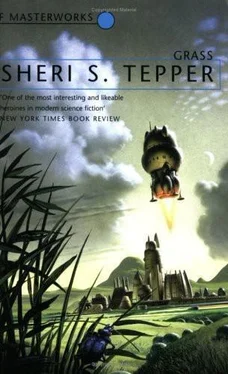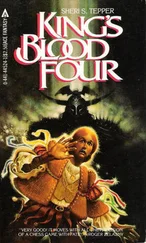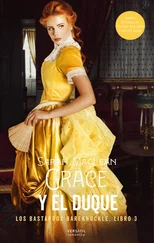Sheri Tepper - Grass
Здесь есть возможность читать онлайн «Sheri Tepper - Grass» весь текст электронной книги совершенно бесплатно (целиком полную версию без сокращений). В некоторых случаях можно слушать аудио, скачать через торрент в формате fb2 и присутствует краткое содержание. Город: London, Год выпуска: 2002, ISBN: 2002, Издательство: Gollancz, Жанр: Фантастика и фэнтези, на английском языке. Описание произведения, (предисловие) а так же отзывы посетителей доступны на портале библиотеки ЛибКат.
- Название:Grass
- Автор:
- Издательство:Gollancz
- Жанр:
- Год:2002
- Город:London
- ISBN:9781857987980
- Рейтинг книги:4 / 5. Голосов: 1
-
Избранное:Добавить в избранное
- Отзывы:
-
Ваша оценка:
- 80
- 1
- 2
- 3
- 4
- 5
Grass: краткое содержание, описание и аннотация
Предлагаем к чтению аннотацию, описание, краткое содержание или предисловие (зависит от того, что написал сам автор книги «Grass»). Если вы не нашли необходимую информацию о книге — напишите в комментариях, мы постараемся отыскать её.
Grass — читать онлайн бесплатно полную книгу (весь текст) целиком
Ниже представлен текст книги, разбитый по страницам. Система сохранения места последней прочитанной страницы, позволяет с удобством читать онлайн бесплатно книгу «Grass», без необходимости каждый раз заново искать на чём Вы остановились. Поставьте закладку, и сможете в любой момент перейти на страницу, на которой закончили чтение.
Интервал:
Закладка:
“Got too much for you?”
Rillibee nodded.
“Me, too,” said Brother Mainoa. “Except I didn’t ask questions. I tried to run away. You were probably a pledged acolyte too, weren’t you? How long were you pledged for?”
“I wasn’t really pledged. They took me, is all, when… well, when I didn’t have anyplace else to go. They said twelve years and I could do what I wanted.”
“Me, I was pledged for five years, but I couldn’t get through them. Just couldn’t. My folks pledged me from my fifteenth birthday. By age seventeen I was here on Grass, digging up Arbai bones, and I’ve been here since. Penitent as all get-out. Ah, well. Maybe if I’d been a little older.” He took the steaming cup from the cooker. “Here, drink this. It really will help. Elder Brother Laeroa gave me some years ago when he fetched me from the port, though he was only young Brother Laeroa then, and I’ve given some to a dozen since then. It always seems to help. You’ll be hungry all the time for a long time, then eventually it’ll taper off. Don’t know why. Just part of bein’ on Grass. You can tell me about yourself, too. More I know about you, easier it’ll be to help you out.”
Rillibee sipped, not knowing what to say. “You want the story of my life?”
Mainoa thought about this for a time, his face adopting varying expressions of acceptance and rejection before it finally cleared. “Yes, I guess I do. Some people, I wouldn’t, you know. But you, I think so.”
“Why me?”
“Oh, one thing and another. The way you look. Your name. Now that’s an unusual name for one of the Sanctified.”
“I never was one of them. They just took me, I told you.”
“Tell me more, boy. Tell me everything there is to know.”
Rillibee sighed, wondering what there was to know, remembering, unable not to remember.
The house in Red Canyon had thick adobe walls, mud walls that stayed warm at night and cool in the day. The walls crumbled a little in the winter snow and when it rained, so that every summer Miriam and Joshua and Song and Rillibee had to spend most of a week putting more adobe on and smoothing it out and letting it dry. Inside the house the floors were tiled. One floor was red and the one in the next room was green, one was blue, the next one had patterns in the tiles. Song taught him to play hopscotch on the tiles in his bedroom, and there were dark and light ones in front of the fireplace, little ones, about two inches across, where Joshua and Miriam played checkers. The checkers were made out of clay, too, with leaves pressed into the tops so the pattern stayed after the leaves burned away. Miriam fired them in the same oven she fired the floor tile in, the funny old brick kiln out back, the one that pulled the fire in from the front.
There were three bedrooms, a little one each for Rillibee and Songbird and a big one for Joshua and Miriam. Sometimes Rillibee called them Mom and Dad and sometimes he called them by their names. Miriam said it was all right, because sometimes he meant to talk to his Mom or his Dad and other times he just meant to talk to somebody named Miriam or Joshua.
The kitchen was a big room and the common room was bigger yet, with a painting of Miriam over the fireplace and two big, squashy couches. There were old, old Indian rugs on the floors and a table where they all ate supper. Mostly they ate breakfast in the kitchen.
Joshua’s shop was off to one side, with a cellar partly under it and partly under Rillibee’s room. Joshua used the cellar to store the wood he would turn into tables and chairs and cabinets after it had seasoned. There were power tools in the shop and Miriam’s potter’s wheel and a big door along the creek side that stood open all summer long.
The low, earthen bulk of the house and shop stretched along Red Creek beside monstrous old cottonwoods that dangled their leafy branches over it, green in summer, heartbreak gold in the fall. Miriam called it that. Heartbreak gold. So beautiful it made you catch your breath when the sun came through, like the touch of the hand of God. Miriam said a lot of things like that, old-fashioned kinds of things. Even her name was old-fashioned. A really antique name, from a long, long time before.
His father, too. Joshua. That was an antique name for you. Even the things Joshua and Miriam did were old-fashioned things, things nobody else did — woodworking, pottery, gardening, making things with their hands, growing things in the soil.
In between making stuff or growing stuff they were always taking Rillibee and Songbird out to show them something or other, a flower or a crawdad or a fish. There were lots of fish in the creek. There were deer in the canyon. There were sage chickens and wild turkey on the rimrock, way up there. “This is one of the few places on earth that man hasn’t made garbage out of,” Joshua said sometimes, pointing up the canyon. “Live in it. Watch out for it. Take care of it. Every springtime move out to the front edge of it and plant something that will live longer than you do.”
Joshua and Miriam had been doing that for twenty years, ever since Joshua came back from Repentence, planting things every spring. Up the canyon along Red Creek the trees were old and big. Joshua’s grandfather had planted those. Orchards stood below the house, apple and cherry and plum, trees four times as tall as Joshua, clouds of blossoms in the spring, Joshua’s father had planted the fruit trees. Then came the groves Joshua had planted, young conifers, shorter and shorter ones as they reached the edge of the green belt Joshua and Miriam had made. Beyond the green was the gray, flat land: dry soil specked with knapweed and thistle and thorny brush, cut by the dusty knife edge of the road. Down that road was the town and the school, a Sanctity town and a Sanctity school. Rillibee’s folks weren’t Sanctified, but they sent Rillibee to school there anyhow. It was closest, and besides the things Joshua and Miriam taught him, he needed to learn the things a school could teach. School was only a mile away, easy to get to most of the year. Once in a while they’d be snowed in for a week or so, but that was rare. Sometimes Rillibee brought kids home from school with him, but that was rare, too. Mostly they thought he was strange.
Their parents all worked in comnet cubicles at their apartments, or they worked in one of the technical centers along the surface route! They went back and forth on covered walkways. If they needed to go very far, they had hovers. Joshua and Miriam had donkeys, for cries sake. Donkeys. It was enough to make Rillibee’s schoolmates chop themselves into pieces laughing about the earthfreaks who ate food they grew themselves and wouldn’t use dirty words and wore funny-looking clothes. Rillibee never heard the word earthfreak until he was in fourth category. Then he thought he’d never hear the end of it.
Rillibee minded more than Song did. She had a boyfriend who belonged to another earthfreak family over in Rattlesnake, and the two of them got along fine. Jason was his name. Another old-time name. Jason used some bad words, but never in front of Joshua. That’s one thing Joshua was death on, bad words, and when he was around, Rillibee was careful not to say any.
“Why’d you call me Rillibee?” he complained to his mother after one particularly bad day at school when everyone was busy making fun of him for his name and his clothes and his folks. “Why Rillibee?”
“It’s the sound the water makes running over stones,” she said. “I heard it the night before you were born.”
How could you yell at somebody over that? She just stood there, smiling at him, taking hot cookies out of the oven, piling them onto a plate for him, getting him a cup of the milk she’d put in the stream to cool. “Rillibee,” she said, so that he heard the water sound in it. “Rillibee.”
Читать дальшеИнтервал:
Закладка:
Похожие книги на «Grass»
Представляем Вашему вниманию похожие книги на «Grass» списком для выбора. Мы отобрали схожую по названию и смыслу литературу в надежде предоставить читателям больше вариантов отыскать новые, интересные, ещё непрочитанные произведения.
Обсуждение, отзывы о книге «Grass» и просто собственные мнения читателей. Оставьте ваши комментарии, напишите, что Вы думаете о произведении, его смысле или главных героях. Укажите что конкретно понравилось, а что нет, и почему Вы так считаете.












